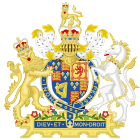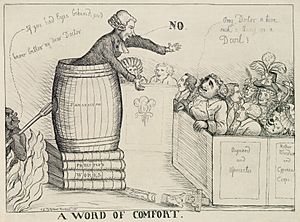Test Acts facts for kids
The Test Acts were a set of laws in England that made people prove their religion before they could hold public jobs. These laws mainly affected Catholics and Protestants who didn't follow the official Church of England.
The main idea was that only people who took communion in the Church of England could work for the government. If you didn't follow the Church of England, you faced strict penalties. These laws were called "penal laws" because they punished people for their religious beliefs.
Even though these laws were meant for everyone who wasn't Anglican, non-Anglican Protestants often found ways around them. Parliament sometimes passed "Acts of Indemnity," which excused them from these rules. For example, the Indemnity Act 1727 helped many non-Anglican Protestants.
However, at universities like Oxbridge (Oxford and Cambridge), non-Anglicans and Catholics couldn't study or graduate until 1871. The Test Acts were rarely used after 1800 and were officially ended in 1828.
Similar laws were also made in Scotland for the Presbyterian Church of Scotland. In Ireland, the Anglican Church of Ireland had similar laws. These laws helped the Anglican minority keep control of land, law, and politics.
Contents
The Corporation Act of 1661
The Naturalisation and Restoration of Blood Act 1609 first said that people who became citizens had to take communion.
Later, during the time of King Charles II, taking communion in the Church of England became a must for holding public jobs. The first law to do this was the Corporation Act 1661. It said that all members of town councils had to take the Oath of Supremacy. They also had to receive communion in the Church of England within a year of being elected.
The Test Act of 1673
| Act of Parliament | |

|
|
| Long title | An Act for preventing Dangers which may happen from Popish Recusants. |
|---|---|
| Citation | 25 Cha. 2. c. 2 |
| Territorial extent | |
| Dates | |
| Royal assent | 29 March 1673 |
| Commencement | 4 February 1673 |
| Repealed | 28 July 1863 |
| Other legislation | |
| Amended by |
|
| Repealed by | Statute Law Revision Act 1863 |
|
Status: Repealed
|
|
| Text of statute as originally enacted | |
After the Corporation Act, the Test Act 1673 was passed. This law was also known as "An act for preventing dangers which may happen from popish recusants." It made sure that anyone in a government job, whether civil, military, or religious, had to take oaths of loyalty. They also had to declare they didn't believe in transubstantiation. This is a Catholic belief about the bread and wine in communion. They also had to receive communion within three months of starting their job.
The oath for the Test Act of 1673 said:
I, N, do declare that I do believe that there is not any transubstantiation in the sacrament of the Lord's Supper, or in the elements of the bread and wine, at or after the consecration thereof by any person whatsoever.
This act was passed in 1673. One big reason for this law was to break up the "Cabal ministry." This was a group of powerful advisors to King Charles II. Some of them had different religious beliefs. For example, Lord Clifford was Catholic and couldn't take the oath. He had to resign, and the Cabal ministry fell apart.
Also, in 1673, it became public that James, Duke of York, who was next in line for the throne, had become Catholic. This made many people in Parliament worried.
The 1678 Act for Parliament
| Parliament Act 1678 | |
|---|---|
| Act of Parliament | |

|
|
| Long title | An Act for the more effectuall preserving the Kings Person and Government by disableing Papists from sitting in either House of Parlyament. |
| Citation | 30 Cha. 2. St. 2. |
| Dates | |
| Royal assent | 30 November 1678 |
| Other legislation | |
| Amends | Popish Recusants Act 1672 |
| Repealed by | Parliamentary Oaths Act 1866 |
|
Status: Repealed
|
|
| Text of statute as originally enacted | |
At first, the Test Act didn't apply to members of the House of Lords. But in 1678, a new act was passed. This act made all members of the House of Lords and the House of Commons declare against Catholic beliefs. This meant that Catholics were not allowed to be members of Parliament.
This change happened partly because of the "Popish Plot," a false story about Catholics planning to kill the King. The House of Lords didn't like this new rule. They tried to delay it and made sure that the future King James II, who was Catholic, was exempt from it.
Test Acts in Scotland
In Scotland, a religious test was put in place right after the Reformation. A 1567 law said that no one could hold a public job unless they followed Calvinism. The Scottish Test Act was passed in 1681 but was removed in 1690.
Later, attempts to keep Scotland out of the English Test Acts failed. In 1707, anyone working in a university or school in Scotland had to agree to the Westminster Confession of Faith. This was a statement of Presbyterian beliefs. Unlike in England and Ireland, taking communion was never part of the test in Scotland.
The need to agree to the Confession of Faith for university jobs was removed in 1853. Instead, people had to promise not to teach anything against the Bible or the Confession of Faith. They also promised not to harm the Church of Scotland. All religious tests in Scotland were finally ended by an act in 1889.

Ending the Test Acts
The rule about receiving communion to hold office was ended in Ireland in 1780. In England and Wales, it was ended in 1828. Rules about taking oaths against transubstantiation were removed by the Roman Catholic Relief Act 1829. Sir Robert Peel helped lead the government in ending these laws.
The acts from 1661, 1672, and 1678 were officially removed by later laws in the 1860s and 1870s. Religious tests for people working at old universities were also ended by acts in 1871, 1873, and 1889.
 | George Robert Carruthers |
 | Patricia Bath |
 | Jan Ernst Matzeliger |
 | Alexander Miles |

